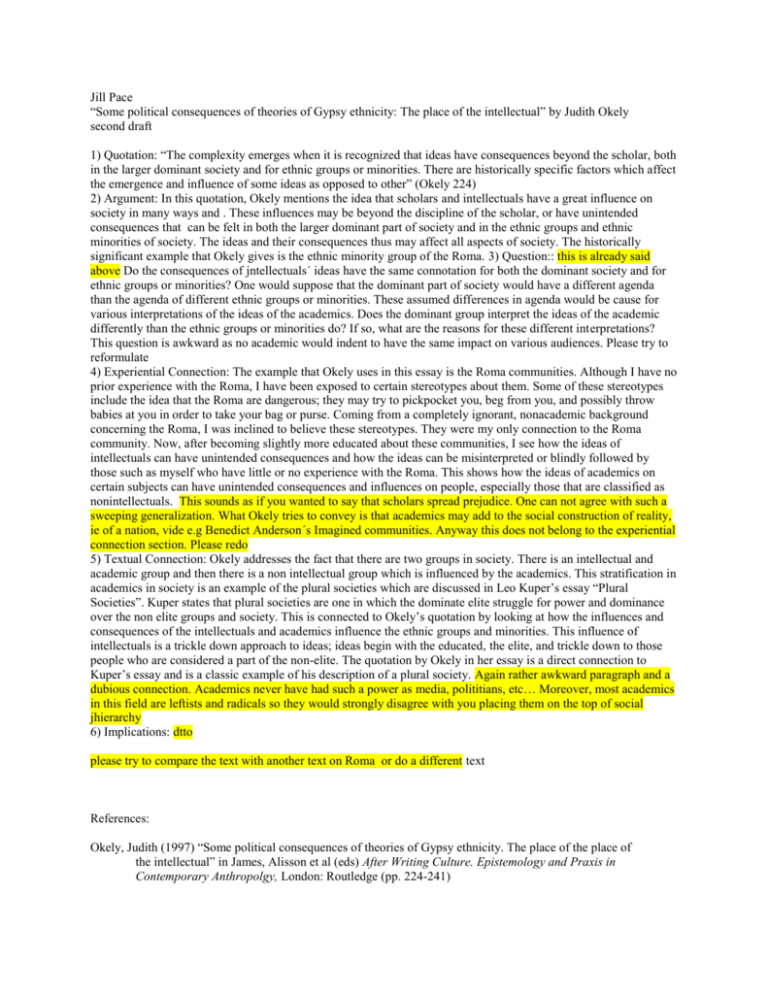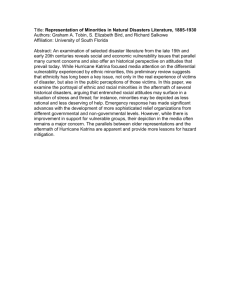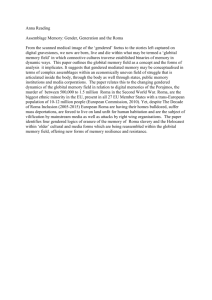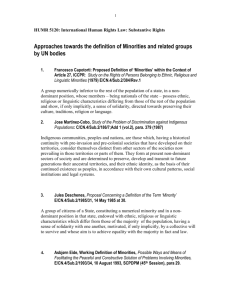Jill Pace - minority
advertisement

Jill Pace “Some political consequences of theories of Gypsy ethnicity: The place of the intellectual” by Judith Okely second draft 1) Quotation: “The complexity emerges when it is recognized that ideas have consequences beyond the scholar, both in the larger dominant society and for ethnic groups or minorities. There are historically specific factors which affect the emergence and influence of some ideas as opposed to other” (Okely 224) 2) Argument: In this quotation, Okely mentions the idea that scholars and intellectuals have a great influence on society in many ways and . These influences may be beyond the discipline of the scholar, or have unintended consequences that can be felt in both the larger dominant part of society and in the ethnic groups and ethnic minorities of society. The ideas and their consequences thus may affect all aspects of society. The historically significant example that Okely gives is the ethnic minority group of the Roma. 3) Question:: this is already said above Do the consequences of jntellectuals´ ideas have the same connotation for both the dominant society and for ethnic groups or minorities? One would suppose that the dominant part of society would have a different agenda than the agenda of different ethnic groups or minorities. These assumed differences in agenda would be cause for various interpretations of the ideas of the academics. Does the dominant group interpret the ideas of the academic differently than the ethnic groups or minorities do? If so, what are the reasons for these different interpretations? This question is awkward as no academic would indent to have the same impact on various audiences. Please try to reformulate 4) Experiential Connection: The example that Okely uses in this essay is the Roma communities. Although I have no prior experience with the Roma, I have been exposed to certain stereotypes about them. Some of these stereotypes include the idea that the Roma are dangerous; they may try to pickpocket you, beg from you, and possibly throw babies at you in order to take your bag or purse. Coming from a completely ignorant, nonacademic background concerning the Roma, I was inclined to believe these stereotypes. They were my only connection to the Roma community. Now, after becoming slightly more educated about these communities, I see how the ideas of intellectuals can have unintended consequences and how the ideas can be misinterpreted or blindly followed by those such as myself who have little or no experience with the Roma. This shows how the ideas of academics on certain subjects can have unintended consequences and influences on people, especially those that are classified as nonintellectuals. This sounds as if you wanted to say that scholars spread prejudice. One can not agree with such a sweeping generalization. What Okely tries to convey is that academics may add to the social construction of reality, ie of a nation, vide e.g Benedict Anderson´s Imagined communities. Anyway this does not belong to the experiential connection section. Please redo 5) Textual Connection: Okely addresses the fact that there are two groups in society. There is an intellectual and academic group and then there is a non intellectual group which is influenced by the academics. This stratification in academics in society is an example of the plural societies which are discussed in Leo Kuper’s essay “Plural Societies”. Kuper states that plural societies are one in which the dominate elite struggle for power and dominance over the non elite groups and society. This is connected to Okely’s quotation by looking at how the influences and consequences of the intellectuals and academics influence the ethnic groups and minorities. This influence of intellectuals is a trickle down approach to ideas; ideas begin with the educated, the elite, and trickle down to those people who are considered a part of the non-elite. The quotation by Okely in her essay is a direct connection to Kuper’s essay and is a classic example of his description of a plural society. Again rather awkward paragraph and a dubious connection. Academics never have had such a power as media, polititians, etc… Moreover, most academics in this field are leftists and radicals so they would strongly disagree with you placing them on the top of social jhierarchy 6) Implications: dtto please try to compare the text with another text on Roma or do a different text References: Okely, Judith (1997) “Some political consequences of theories of Gypsy ethnicity. The place of the place of the intellectual” in James, Alisson et al (eds) After Writing Culture. Epistemology and Praxis in Contemporary Anthropolgy, London: Routledge (pp. 224-241) Kuper, Leo (2001) “Plural Societies” in Guibernau, Montserrat and Rex, John (eds): The Ethnicity Reader, nationalism, Multiculturalism and Migration, Cambridge, UK: Polity Press, pp. 205-220 C-D








